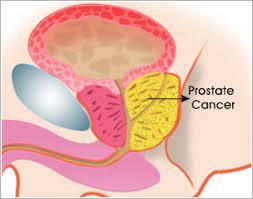
Prostate cancer is one of the most common types of cancer in men. It often grows slowly and initially remains confined to the prostate gland, where it may not cause serious harm. However, some types of prostate cancer can grow and spread quickly, which can have life-threatening consequences. Understanding the symptoms of prostate cancer is crucial for early detection and timely treatment.
Many men with prostate cancer will not experience any symptoms, especially in the early stages of the disease. However, for those who do experience symptoms, they may include changes in urinary or sexual function, as well as pain and discomfort in the pelvis and lower back. It is important for men to be aware of the potential signs and symptoms of prostate cancer, so that they can seek medical attention if necessary.
1. Changes in Urinary Function
One of the most common symptoms of prostate cancer is changes in urinary function. These changes may include increased frequency of urination, especially at night, difficulty starting or stopping urination, weak urine flow, or a feeling of incomplete emptying of the bladder. Men may also experience pain or burning during urination, as well as blood in the urine. These symptoms may be indicative of prostate cancer and should be discussed with a healthcare professional.
2. Sexual Dysfunction
Prostate cancer can also cause sexual dysfunction in men. This may manifest as difficulty getting or maintaining an erection, painful ejaculation, or a decrease in sexual desire. While these symptoms can be caused by a variety of factors, they may also be linked to prostate cancer. It is important for men experiencing sexual dysfunction to speak with a doctor to determine the cause and receive appropriate evaluation and care.
3. Pain and Discomfort
Pain and discomfort in the pelvis, hips, or lower back can sometimes indicate the presence of prostate cancer. This pain may be persistent or come and go, and can vary in intensity. Men should pay attention to any unexplained pain or discomfort in these areas, and bring it to the attention of a healthcare provider for further evaluation and investigation.
4. Blood in the Urine or Semen
Seeing blood in the urine or semen can be alarming, and should always be evaluated by a healthcare professional. While these symptoms can be caused by other conditions, they may also be a sign of prostate cancer. Any visible sign of blood in the urine or semen should prompt a visit to the doctor for further assessment and testing.
5. Erectile Dysfunction
Erectile dysfunction, or the inability to achieve or maintain an erection, can be a symptom of prostate cancer. This is because the prostate gland is located near the nerves and blood vessels responsible for erectile function. Therefore, the growth of a prostate tumor can potentially impact these structures and lead to erectile dysfunction. Men experiencing this symptom should seek medical evaluation to identify the underlying cause and receive appropriate care.
6. Weakness or Numbness in the Legs or Feet
In advanced cases of prostate cancer that have spread to the bones, men may experience weakness or numbness in the legs or feet. This can occur as a result of compression or damage to the spinal cord or nerves due to the spread of cancer. If these symptoms develop, it is important to seek immediate medical attention for further evaluation and management.
7. Weight Loss and Fatigue
Unexplained weight loss and fatigue can be symptoms of advanced prostate cancer. As the cancer progresses, it can impact the body’s ability to function properly, leading to weight loss and persistent fatigue. Men experiencing these symptoms should consult with a healthcare provider to determine the underlying cause and receive appropriate support and care.
8. Bowel Changes
In some cases, prostate cancer can cause changes in bowel habits, such as constipation, diarrhea, or difficulty with bowel movements. These symptoms may be indicative of the cancer spreading to nearby tissues or organs, and should be promptly evaluated by a healthcare professional.
9. Swelling in the Legs or Pelvis
If the prostate cancer has spread to the lymph nodes or other organs, it can cause swelling in the legs or pelvis. This swelling may be due to the build-up of fluid, a condition known as lymphedema. Men experiencing unexplained swelling should seek medical evaluation to determine the cause and receive appropriate management.
10. Trouble Breathing
In advanced cases of prostate cancer that have spread to the lungs, men may experience symptoms such as cough, shortness of breath, and chest pain. These symptoms can be indicative of cancer metastasis to the lungs, and should be promptly assessed by a healthcare provider.












